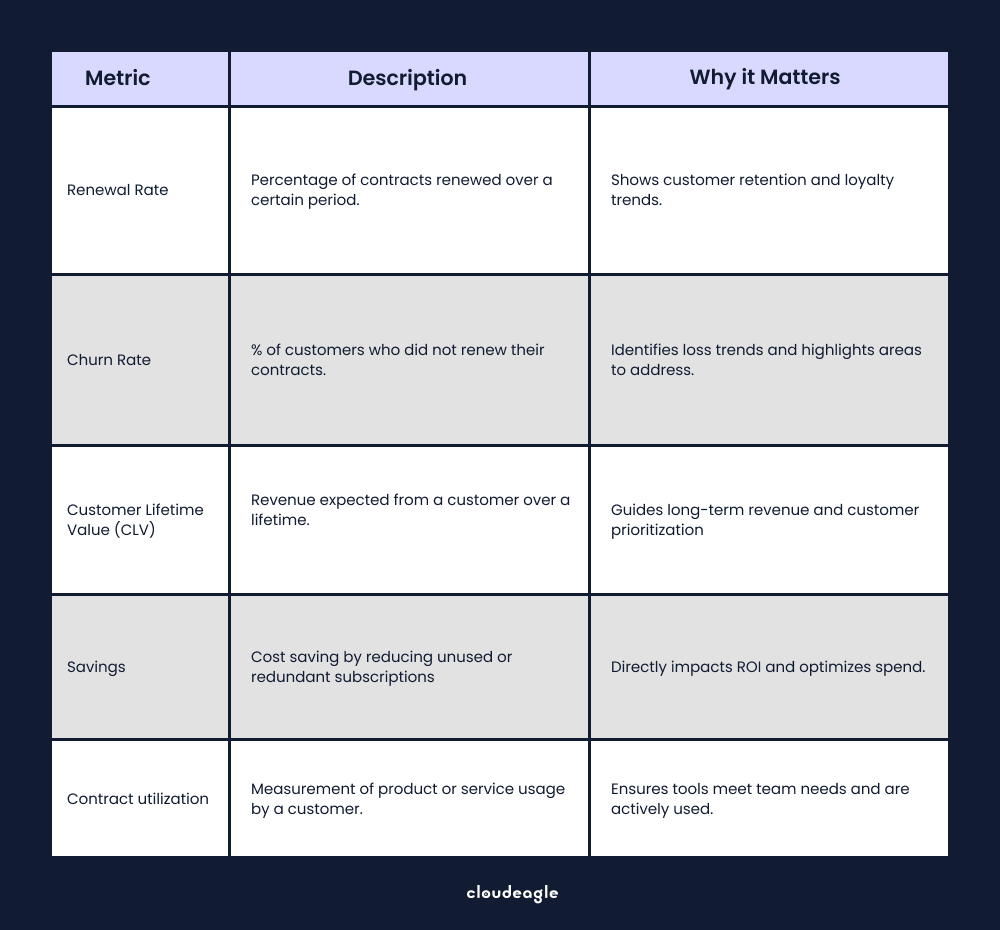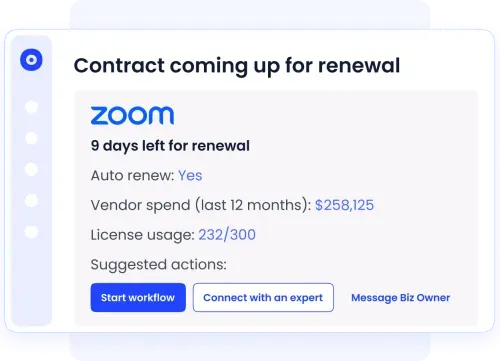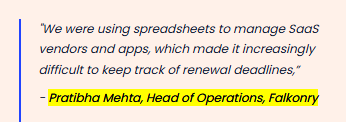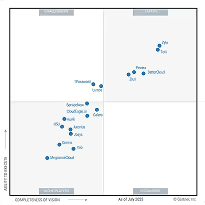HIPAA Compliance Checklist for 2025

Renewal deadlines have a way of sneaking up, don’t they? Before you know it, another contract auto-renews, often at terms you haven’t looked at in months.
But here’s the thing: SaaS renewals don’t have to be last-minute decisions or missed opportunities. With the right renewal management best practices, you can turn each renewal into a strategic move to boost ROI and cut unnecessary costs.
But how can you do so?
Let’s explore the common challenges of renewal management and how best practices can help you make the most of it.
So, let’s dive in!
TL;DR
- Renewal management is more than tracking dates. It’s about reviewing each contract to ensure it adds value and helps teams cut unnecessary costs.
- Missed deadlines and budget misalignment can prevent renewals. Proactively addressing these challenges ensures renewals fit organizational goals and financial plans.
- Metrics like renewal rate, churn, and contract utilization reveal insights into contract performance and guide smarter renewal decisions.
- SaaS renewal best practices include centralizing contracts, setting up automated reminders, and integrating with tools like Slack to streamline processes and improve collaboration.
- CloudEagle.ai offers automated alerts, real-time usage insights, and integration options to keep renewals on track, helping teams maximize ROI on every contract renewal.
What is Renewal Management?
Renewal management is a system for tracking contract renewals, especially for subscription-based services like SaaS tools. It helps businesses stay organized, avoid missed renewal deadlines, and stop paying for services they don’t need.
Imagine your team relies on several software tools. As renewal dates approach, you can either let those contracts auto-renew, sometimes with outdated terms, or use SaaS renewal best practices to review which tools still bring value.
Renewal management keeps all contract dates, terms, and costs in one place, with automated reminders to prompt reviews well before deadlines. This process allows you to negotiate better terms, cancel unused tools, or make adjustments so that each renewal truly serves your team’s current needs.
What Is A SaaS Renewal Strategy?
A SaaS renewal strategy in management, especially within the context of SaaS renewals, refers to the structured approach organizations use to handle the contract renewal process, optimize spending, and reduce risk throughout the software license renewal process.
This strategy typically covers tracking license and contract expiration dates, proactively reviewing usage, and renegotiating terms with vendors to ensure you only pay for what’s needed.
A well-defined SaaS renewal strategy relies on best practices such as maintaining accurate license data, leveraging renewal management software for automated alerts, and continuously analyzing usage to identify opportunities for license reclamation or consolidation. These practices reduce unnecessary spending and ensure compliance throughout the SaaS renewal process.
What Does A Renewal Manager Do?
A renewal manager is responsible for overseeing the entire contract renewal process, particularly for SaaS renewals and software license renewals. This includes tracking renewal dates, communicating with vendors, negotiating renewal terms, ensuring all compliance obligations are met, and optimizing license usage to maximize ROI.
They use software renewal management tools and best practices to streamline workflows, automate reminders, and provide detailed reporting on upcoming renewals and cost-saving opportunities. In larger organizations, renewal managers also coordinate with procurement, finance, and IT to develop and execute renewal strategies that support business goals and operational efficiency.
Why Renewal Management Matters for Your Budget?
Renewals aren’t just about signing off on another year of service – they’re opportunities to optimize spending, reduce waste, and build stronger relationships with vendors. When implemented well, the SaaS renewal best practices create multiple layers of value:
1. Cost Savings
Every SaaS contract renewal is a chance to review what’s necessary and cut what isn’t. Imagine realizing that only half a team uses a tool—downgrading or canceling can free up the budget for other investments.
2. Stronger Vendor Partnerships
By engaging early, businesses can often negotiate better terms, discover new features, or discuss cost-effective options based on usage.
3. Budget Control
A structured renewal process makes predicting and managing expenses easier, which is critical when managing multiple subscriptions.
With a strategic approach, SaaS renewal best practices turn recurring costs into opportunities for financial efficiency and long-term success.
Common Challenges in Renewal Management
Effective SaaS renewal management isn’t about hurdles. Businesses often face a few key challenges. These include:
Missed Deadlines
Tracking multiple renewal dates is no small task, and missed deadlines often lead to auto-renewals or, worse, service interruptions.
Budget Alignment Issues
If SaaS renewals don’t sync with budget cycles, unplanned renewals can easily disrupt the budgeting process.
Vendor Relationships
Without a clear renewal strategy, businesses might miss opportunities to negotiate or explore different service options before contracts auto-renew.
Addressing these common challenges early on with best practices of renewal management helps companies take a proactive approach, saving time, money, and effort with each renewal cycle.
Key Metrics to Track for Renewal Success

Best Practices for Renewal Management
1. Keep All Contracts And Dates In One Place
Renewals often get messy when contracts scatter across platforms, and no one knows who manages them. Creating a central repository for contracts, renewal dates, and relevant details helps teams see what’s coming up and avoid unexpected renewals.
Centralizing contracts reduces the chance of auto-renewals and makes it easy to pull data for budget reviews and vendor discussions. Setting up a renewal calendar with reminders ensures that renewals don’t catch anyone by surprise.
Pro tip: For busy teams, automated reminders set 30, 60, or even 90 days before renewal deadlines can be a lifesaver, providing enough time to assess contract value and negotiate terms. Get a tool that can show reminders like these:

2. Use Automated Alerts To Avoid Last-minute Surprises
Managing renewals manually can lead to missed deadlines, especially when team members juggle multiple priorities.
Automated alerts ensure that every renewal date accounts for, with reminders sent well in advance. This way, you’re not looking up everything last minute and have enough time to review each contract thoroughly.
For instance, CloudEagle.ai helped Falkonry, a company struggling with missed renewals and unnecessary costs, by automating reminders that alerted stakeholders until they made a renewal decision.

The reminders stopped only once they renewed the contracts, saving Falkonry time and preventing costly auto-renewals.
3. Streamline Renewals With Slack And Jira Integrations
Integrating renewals into existing workflows, like Slack or Jira, keeps everyone aligned without adding extra steps. Renewal notifications, approvals, and discussions become part of your daily tools, meaning no one has to switch platforms to stay updated.

Imagine receiving a renewal alert in Slack, where your team can review the contract, comment, and approve – all without leaving the chat. This approach saves time and keeps SaaS renewal management visible to all stakeholders, enhancing transparency and making it easy to collaborate.
Pro Tip: Centralized notifications in Slack or Jira reduce confusion and ensure everyone involved stays on the same page.

4. Audit Usage Regularly To Prevent Wasted Spend
Renewal time is a chance to make sure you’re getting what you pay for. Regular audits reveal whether you use tools fully or if they’ve become “shelfware” – software that’s paid for but rarely used.
Usage audits help identify gaps, allowing you to make data-driven decisions about renewing, consolidating, or canceling subscriptions.
By evaluating usage, businesses can prevent overspending and allocate resources more effectively. For example, the CloudEagle.ai tool offers usage insights, helping teams analyze app usage trends to make smarter renewal choices.
5. Plan Ahead For Budget Cycles To Avoid Surprises
Aligning contract renewals with budget cycles can help prevent unexpected costs and ensure each renewal receives the attention it deserves.
Renewal discussions should ideally happen well before a company finalizes its annual budget so teams can allocate funds where they’re needed most.
For example, starting budget conversations 90 days before a renewal provides enough time to determine if the current contract terms still align with team goals.

It also gives you time to negotiate terms or make adjustments if needed, helping prevent renewals before becoming an afterthought in the budget process.
6. Showcase Roi And Usage Wins To Strengthen Renewals
Renewals go smoother when stakeholders already see the tool's value. As renewal dates approach, gather data on how the tool has contributed to key business outcomes, such as time saved, operational efficiency, or cost reductions.
When you highlight these wins, you can reinforce the product's value, making it easier for decision-makers to see why a renewal is beneficial.
For instance, Falkonry’s experience with CloudEagle.ai underscores this point. CloudEagle.ai’s renewal workflows provided Falkonry with insights into contract utilization and ROI metrics, enabling the team to assess each tool’s value before renewal time. This helped them make data-driven decisions, resulting in over $400,000 in annual savings.
But how did we do it?
Problem:

Solution:

Outcome:

If a tool’s usage and benefits are apparent, stakeholders are more likely to approve renewals – and even consider expanding the contract if the tool has shown strong value.
Pro Tip: Prepare a brief report with usage stats and key ROI metrics before renewal discussions. This will make it easier to communicate the tool’s value.
How to Set a Renewal Management System?
When you have SaaS renewal best practices, managing renewals becomes much easier. A structured SaaS renewal management software can streamline the entire process; implementing it helps teams avoid missed deadlines and make smarter financial decisions.
Here’s a quick guide to set one up:
Choose an automated SaaS renewal management software
Begin by selecting a reliable, automated tool that can handle renewals efficiently. A dedicated contract renewal management software streamlines the process, keeping you organized and reducing manual effort.
Integrate with all contracts
Connect the system with all your existing contracts across departments. This integration ensures that the platform can track every renewal that makes it easier to monitor and manage contract details in one place.
Centralize all contracts in one place:
Bring all contracts, renewal dates, and key terms into a centralized dashboard. A single, accessible repository gives your team full visibility so they never lose track of any renewal.
Set up automated renewal reminders:
Schedule reminders 60-90 days before each renewal date to allow for thorough reviews and prevent rushed decisions. Automated alerts help you stay proactive, keeping renewals from catching you by surprise.
Make informed renewal decisions and renew proactively:
Use your system's usage metrics, renewal rates, and ROI insights to guide renewal decisions. With this data, you can assess each contract’s value, negotiate better terms, and ensure each renewal aligns with your goals.
CloudEagle.ai: The Smarter Way to Manage SaaS Renewals
Managing SaaS renewals manually is not only time-consuming—it’s risky. With growing SaaS stacks, multiple contract terms, and auto-renewal clauses hidden in fine print, IT and procurement teams often struggle to keep up. Missed renewal deadlines, surprise charges, and features. It brings together contract visibility, real-time usage data, proactive alerts, and pricing benchmarks, all in one platform, so you can confidently optimize every SaaS renewal decision.
Automated Renewal Workflow
CloudEagle.ai eliminates the need for spreadsheets, manual reminders, and back-and-forth emails. The platform automatically tracks renewal dates, sends early alerts, and routes approvals through pre-defined workflows. This ensures every renewal request reaches the right stakeholder in time and no renewal slips through the cracks.

Centralized Contract Management
All your SaaS contracts are securely stored in one place, easily searchable and accessible. CloudEagle.ai uses AI to extract key metadata from contracts, such as renewal terms, notice periods, auto-renewal clauses, payment schedules, and contract value. This helps you quickly understand what’s at stake before a renewal is triggered.

Real-Time Usage Insights
Before renewing a contract, it’s important to understand whether the tool is delivering value. CloudEagle.ai connects directly with your SaaS tools and identity systems to track license usage at the user level. This lets you identify underused licenses, unused accounts, or overlapping apps, so you’re only renewing what’s truly needed.

Renewal Calendar & Custom Alerts
Get a visual snapshot of all upcoming renewals in a centralized calendar. CloudEagle.ai sends smart, customizable alerts ahead of key dates, giving your team enough lead time to assess, renegotiate, or cancel any application as needed. This avoids last-minute decisions or surprise auto-renewals.

Cost Optimization
CloudEagle.ai helps you reduce SaaS waste by identifying unused licenses, duplicate tools, and expensive plans you don’t need. It gives real-time insights so your team can make smart, data-driven renewal decisions, cutting costs and ensuring you only pay for what you actually use.

Price Benchmarking
Negotiating SaaS pricing is often done in the dark. CloudEagle.ai provides pricing benchmarks based on anonymized data from thousands of SaaS transactions. This gives you leverage during vendor negotiations, ensuring you’re paying a fair market rate and not being overcharged for licenses or services.

Final Words: Take Control of Renewals for Maximum ROI
An efficient software license renewal process helps businesses save money, stay compliant, and keep important tools running smoothly. Instead of rushing at the last minute, smart renewal planning turns each renewal into a chance to review usage, cut waste, and renegotiate contracts.
Looking to streamline these best practices? The right tool can make software renewal management simpler, smarter, and more effective.
CloudEagle.ai makes it easy by automating alerts, providing real-time usage insights, and helping you take proactive control of every renewal, so you never miss a deadline or a chance to improve ROI.
Start optimizing your renewals today.
Schedule a demo with CloudEagle.ai and turn every renewal into a strategic win.
FAQs
1. What is renewal management?
Renewal management is the process of tracking and optimizing contract renewals to avoid unnecessary costs and ensure they align with business goals.
2. What is SaaS renewal management?
SaaS renewal management is the process of managing subscription-based software renewals to control costs and optimize software use. By tracking renewal dates and analyzing usage, businesses avoid unnecessary auto-renewals. Successful SaaS renewal management includes strategic planning and alignment with business goals.
3. What is the average renewal rate for SaaS?
The average SaaS renewal rate typically ranges from 75% to 90%, depending on the product and industry.
4. What is the renewal cycle for SaaS?
SaaS renewal cycles usually occur annually or monthly, depending on the subscription terms.
5. What is the 3-3-2-2-2 rule of SaaS?
The 3-3-2-2-2 rule of SaaS is a renewal outreach strategy involving scheduled customer contacts starting 3 months before renewal, followed by reminders at 3 weeks, 2 weeks, 2 days, and on the renewal day. This helps keep customers informed and improves retention by reducing surprise renewals and preventing churn.
.avif)
%201.svg)










.avif)




.avif)
.avif)




.png)









